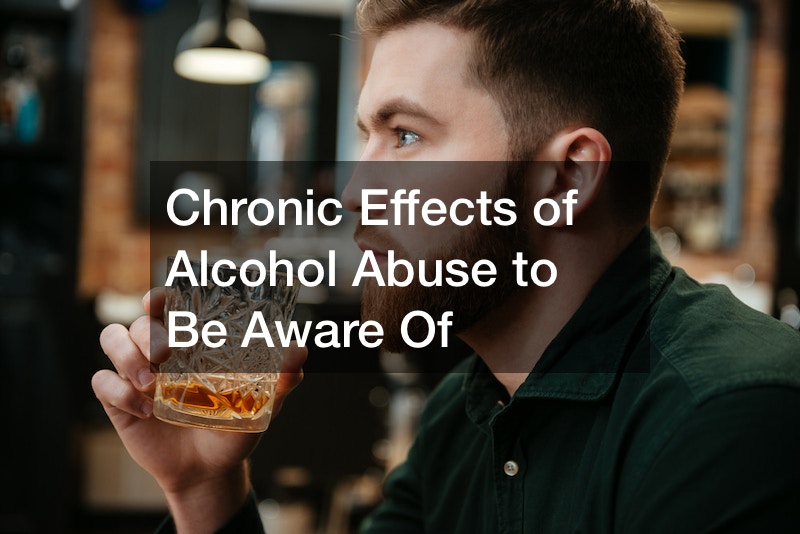
Many people enjoy having a glass of wine or cocktails at happy hour to help relax after a long day or week. With the holidays coming up, you can expect to see more alcohol toasts being made at various parties. However, some people cross the line from social drinking to alcohol abuse. When that happens, it can have devastating impacts on your life and loved ones. Use this guide to become more informed about the chronic effects of alcohol abuse to look out for.
Dental Problems
Alcohol can have many effects on your body. When people think of the immediate effects on your health, they may often think of problems with your liver and heart. However, like cigarette smoke, excessive alcohol use can also create dental problems. You need nutrients to build strong bones and teeth. If your nutrients are constantly being depleted because of excessive consumption of alcohol, then your body isn’t able to rebuild itself as it should.
Alcohol also contains sugar, so if you’re frequently drinking throughout the day but not brushing and flossing as you should, then you’re wreaking havoc on your teeth. Like with any other substance abuse, like drugs, extreme alcohol abuse can cause someone to not think about how they should take care of their body. So something as simple as brushing your teeth every day may no longer be a standard routine if all you can think about is alcohol from sunrise to sunset.
Visit your local dentist at least twice a year to make sure that everything is fine with your oral health. A visit to the dental clinic can check your mouth for oral problems such as cavities and other signs of decay linked to excessive drinking. It can also be linked to mouth and throat cancer. When you go in for regular visits, your dentist will check your mouth and throat area for signs of such problems.

Cardiovascular Issues
Maintaining a strong heart and cardiovascular system is a must for an extensive lifespan. However, you can cut your life or quality of life short with excessive alcohol. Chronic effects of alcohol include high blood pressure, heart disease, and stroke. When blood pressure gets out of control, it can lead to stroke as well as a heart attack. So if you’re lost in the wake of alcohol abuse, you may not be mindful of maintaining a healthy blood pressure or taking medication as needed.
.
Chronic effects of alcohol consumption include the need for peripheral artery disease treatment. When fatty deposits build up in your arteries, it can create peripheral artery disease. You may experience pain, weakness, or numbness in your limbs, particularly the legs and feet. If alcohol becomes your priority in life, you may not have healthy eating habits. As a result, cholesterol may build up in the walls of those arteries and cause PAD. It can also happen due to the blood vessel inflammation that is linked with excessive alcohol consumption. If you suspect that you have this condition, you can immediately begin making lifestyle adjustments, such as getting alcohol treatment, consulting a telehealth professional, and of course, changing your diet.
Gastrointentinal Problems
Drinking alcohol means it goes throughout your digestive system. So some of the chronic effects of alcohol abuse include problems with your gastrointestinal organs. You may also experience digestive problems, especially if you constantly drink alcohol on an empty stomach. Doing so can often lead to the development of stomach ulcers, which can make eating painful.
Failure to deal with these gastrointestinal issues can be harmful to your nutrition. After all, you need your stomach, intestines, liver, and spleen to work together to digest your food. If those organs are injured in any way, they may not be able to process nutrients from the food you eat, regardless of how many fruits and veggies you consume.
Excessive alcohol consumption has been linked to liver disease, especially cirrhosis of the liver. If your liver no longer functions, you may end up needing a transplant. Your liver is responsible for cleaning toxins from your system. It metabolizes your carbohydrates, proteins, and fats so your body can properly use them. It also helps your body produce a blood clot, so you won’t bleed to death in the event of an injury. If this vital organ becomes damaged due to the chronic effects of alcohol, it can result in a major, drastic reduction in the quality of life as well as premature death.

Stiff Joints and Muscles
There’s nothing like being able to walk, run and swim with ease. However, when your body deals with inflammation, it can cause problems with your joints and muscles and make it harder to move around as normal. Alcohol is a major inflammatory substance that makes it harder for your body to build new muscle. Alcohol can disrupt the function of HGH or the human growth hormone that helps to rebuild such muscle and collagen. Collagen is present in connective tissue like ligaments and skin. If you begin showing signs of joint problems, a joint restoration specialist or chiropractor can help you.
Alcohol is also known as a diuretic, which means it dehydrates the body. So muscle strains and cramps are among other chronic effects of alcohol abuse. According to Healthline, you should drink 8-8 oz glasses of water or more a day. So for every alcoholic beverage you consume, you should have at least one or more glasses of water to combat it. If you begin to start alcohol recovery, you may want to utilize aqua therapy such as swimming or relaxing in a hot tub. According to Health Line, about 15 minutes in a hot tub can help reduce the effects of inflammation and muscle pain. The motion of the water in a hot tub provides a massage-like motion on your muscles, back, and other areas that may be cramping up.
Skin Problems
It’s no secret that dry skin doesn’t look appealing. That’s why so many beauty products talk about moisturization. However, one of the best ways to keep your skin moist and supple is from within. In addition to drinking plenty of water and having a healthy diet, you should watch your alcohol consumption. As mentioned, alcohol is a diuretic that will dehydrate your body and that dehydration will show up in your skin. As a result, acne can be among the chronic effects of alcohol abuse.
Does your skin have acne, spotting, or pockmarks left behind as you begin substance abuse recovery? You can always utilize the services of a local acne treatment clinic. Your local med spa has many methods for treating problem skin, such as chemical peels, facials, laser therapy, and more.

Immune Weakness
Now that fall is here, you’re probably hearing a lot about immunity and taking vitamin C to avoid colds and flu. A healthy immune system prevents you from getting sick. Even if you get sick, such as from a cold or even COVID-19, a healthy immune system can reduce your chances of the illness progressing and becoming worse. Unfortunately, one of the chronic effects of alcohol abuse is a weakened immune system, which makes your body ripe for illness.
That illness can include flu, which can later turn into pneumonia. A weakened immune system is also more likely to develop cancer of any part of the body. You’re exposed to so many germs daily whenever you leave the home. So, not having an immune system that can produce enough white blood cells can have a devastating effect on your overall health.
Brain Health
The heart and liver aren’t the only major organs that feel the impact of the chronic effects of alcohol. Your brain, unfortunately, can also be devastated when you become addicted to alcohol. You may experience memory issues and have problems learning new topics. Over time, excessive alcohol can kill brain cells and make it hard to produce new ones. Degenerative diseases such as dementia can also happen as a result of alcohol abuse.
The issues with cognition and learning can affect school or work life. If you have problems learning in school because you’re abusing alcohol, that can result in poor grades and inability to graduate on time. As a result, you may not finish your degree, and you may have less economic prospects. Once you’re already in the working world, regardless of how successful you may be, you can experience a major cognitive decline if you become addicted to alcohol. Then you may not be trusted to handle major projects, and you could even possibly lose your job, which can affect your home life.
Did you know alcohol can also affect your mental health? In addition to being inflammatory and a diuretic, alcohol is also known as a depressant. Sure, you may feel cheery at happy hour or after a few drinks with family and friends over the holidays. Many people may go from being shy to extroverted after a few drinks. After all, getting a little tipsy can help reduce your inhibitions and make you freer in terms of how you act around people. Of course, that loss of inhibitions can also have a negative effect, especially when it comes to making sound decisions regarding driving.
However, when you abuse alcohol over time, it’s easy to experience depression and anxiety. The initial positive high is only when you begin drinking. After the rush wears off, your central nervous system activity decreases with ongoing alcohol consumption.
Poor Decision Making
While people may not consider decision-making a chronic issue, it certainly can be when it comes to alcohol abuse. After all, some people may be characterized by making poor choices. Even when someone isn’t currently drunk, ongoing alcohol abuse affects the structure of your brain. So, you may continue to make questionable choices even when sober if you frequently drink too much alcohol. However, when inebriated, getting behind the wheel of a car may not be considered dangerous to you because you’re not thinking clearly.
As a result, you’re likely to get a DUI if pulled over while driving drunk. If you keep getting fined for driving drunk, your license may be suspended temporarily or permanently. In the worst-case scenarios, you could end up hurting somebody, whether it’s yourself, a passenger, another driver, or a pedestrian. In that case, you may need a DUI lawyer to help you.
Poor decision-making can further impact sexual activity. You may be more likely to have casual sex with a stranger without using protection. Unfortunately, with STDs still rampant, having constant unprotected sex can make you susceptible to diseases that can affect your quality of life or shorten it. It can also result in an unexpected pregnancy you and the other person aren’t ready for.

Relationship Issues
Some of the more chronic effects of alcohol abuse can include relationship problems. Humans are social creatures by nature connected to families, friends, communities, and places of employment. Alcohol addiction can result in an excessive focus on acquiring the next drink, as opposed to handling your relationships responsibly. It could impact your marriage and hurt your children.
Drunk people often say hurtful things to people that they can’t take back. You may end up losing friends because of your behavior. Job-related issues such as disciplinary actions and constantly being fired can also affect your life. However, seeking the right alcohol abuse treatment can get you back on track to have better relationships with people.
As you can see, too much alcohol can have negative impacts on your life if you’re not careful. Have fun with a drink or two with friends and family when possible. However, watch out if you begin using alcohol as a crutch to get through the day or week. When you become dependent on alcohol, it can affect your mental health, heart, liver, and other vital organs. It can have an impact on your relationships and result in you making decisions that can ruin you or someone else’s life. Now that you understand some of the chronic effects of alcohol abuse, you can make decisions moving forward toward alcohol abuse recovery.


